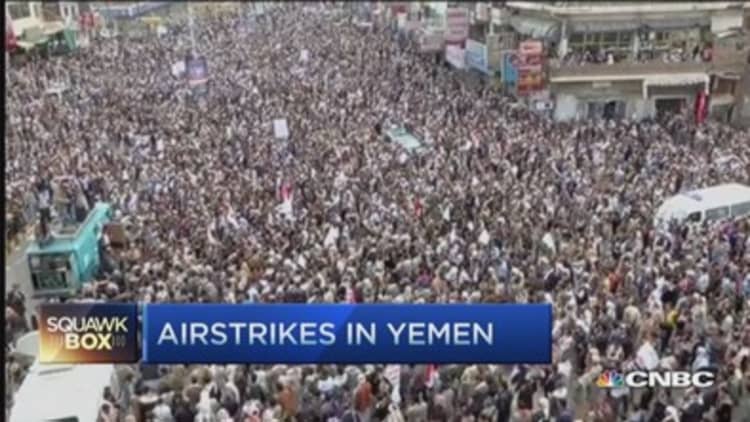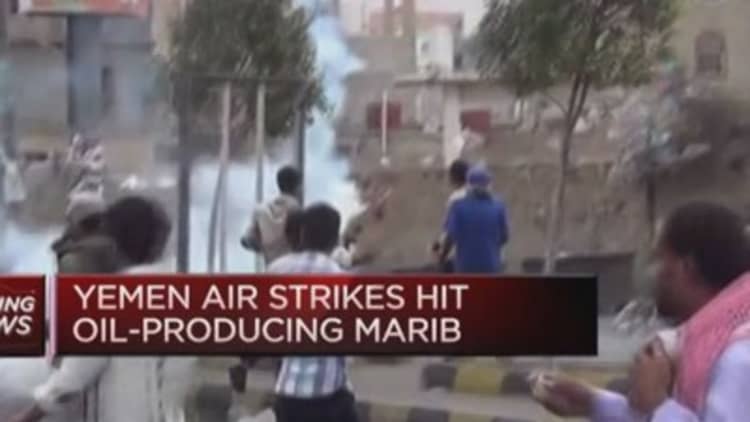


Officials of Yemen's embattled government have expressed confidence that a Saudi-backed offensive would suppress rebels who have torn the country apart. But outside experts are less sure that the Saudis will bring things under control anytime soon.
Energy markets have closely watched the fighting in Yemen—where Saudi Arabia and other regional powers are pounding Shiite Houthi rebel positions from the air—as it could potentially threaten oil supplies from the area. The United States on Thursday pledged to safeguard a major nautical passage near the fighting.
Officials from the region have predicted that the entire conflict could be over relatively quickly. Yemeni Foreign Minister Riyadh Yaseen, asked if the campaign would last days, weeks or more, told Saudi-owned al-Arabiya television: "I expect that this operation will not go on for long, I think it will be days."
He said the door was still open for dialogue with the Houthis, while in a Facebook posting, ousted Yemeni President Abd Rabbuh Mansur Hadi urged his mostly Sunni populace to be patient, saying the "rebels" would soon be gone.
Those rosy pronouncements were not shared by outside observers.
"Neither the Egyptians nor the Saudis are likely to be able to defeat the Houthi and their allies in combat and establish control over the mountainous terrain in which familiarity with the ground will prove a major advantage" for the Houthi, Firas Abi Ali wrote in an analysis Thursday for IHS Jane's.
Read More What another war in the Middle East means
"As such, this intervention carries a high risk of becoming open ended, as the Yemeni army has fragmented, and there is no political leadership capable of restoring order to the country without external support," he added.
Saudi forces understand that a protracted ground war in Yemen could be disastrous, Kamran Bokhari, author of "Political Islam in the Age of Democratization," told CNBC on Thursday.
"They know how difficult it is to pacify this country," he said of the Saudi leadership.
Saudi Arabia has reportedly amassed thousands of troops ready for ground missions in Yemen. Egypt this week suggested that it would consider participating in such an offensive.

Saudi Brig. Gen. Ahmed Asseri, spokesman for the operation, told a news conference there were no plans at this stage for ground operations, but if the need arises, Saudi and allied ground forces would repel "any aggression."
Experts were not hopeful about Saudi Arabia's chances for strategic victory through air power alone, especially since the Houthis have appeared to draw strength from recent their momentum.
Read MoreIs Yemen the new catalyst for oil?
"Ultimately it depends on how weak [the rebels] see themselves, and that will determine the price of stasis," Bokhari said.
Although they are unlikely to be quickly beaten in a ground offensive, the rebels could "probably" be persuaded to come to a negotiating table, said Paul Floyd, senior military analyst for global intelligence and advisory firm Stratfor.
The Houthis may want to maintain control of most of the land they've now seized, but the political and geographic isolation imposed by the Saudi-led coalition could make it difficult to govern those areas, and so negotiations will likely occur eventually, he said.
Mosques in the Saudi capital on Friday preached fiery sermons against the Houthis and their Iranian allies, describing the fight as a religious duty. Saudi Arabia's top clerical council issued a fatwa on Thursday giving its blessing to the campaign.
Meanwhile in the Iranian capital Tehran, Friday prayer leader Ayatollah Kazem Sadeghi described the attacks as "an aggression and interference in Yemen's internal affairs."
Saudi Arabia and other nations have accused Iran of supporting the Houthis, but Tehran denies any ties to the situation in Yemen.
—Reuters contributed to this report.


